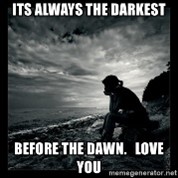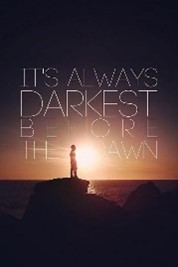Are you looking for a way to tell someone to hang on and make it through the tough times in their life? You could use “It’s always darkest before the dawn” to give them hope that things will turn around. This post unpacks the meaning and origin of this expression.
Meaning
The proverbial expression “it’s always darkest before the dawn” means that there is hope for the future, even when you’re going through hardships in life. It’s a motivating statement designed to inspire the other person and pull them out of their slump or depression.
The saying “it’s always darkest before the dawn” tells someone that the emotional pain they experience or the anxiety they feel will not last forever. You’re telling them to change their thinking and open themselves to new possibilities and opportunities in life.
It’s another way of telling people experiencing a rough time in life that they need to hold on and fight through the dark times to walk into the light of success.
Example Usage
“Mike, I know you’re going through hard times right now, but it’s always darkest before the dawn. Don’t give up; things could turn around quicker than you think.”
“This quarter is a disaster. The economy is killing our business. it’s always darkest before the dawn; let's hope things turn around soon.”
“I’ve been dealing with addiction the last few years, and when I was at rock bottom, someone close to me told me that it’s always darkest before the dawn. I managed to get my life together, and now I’m a productive member of society.”
“Don’t give up, Sam. it’s always darkest before the dawn. We’ve come this far, and turning back now is pointless.”
“I know you’re feeling down. It’s always darkest before the dawn, and these bad times can’t last forever. Sooner or later, things will turn the corner for you.”


Origin
The origin of the expression "it's always darkest before the dawn" comes from the self-help industry. This proverbial saying is an iteration of "the darkest hour," which was introduced in English in the late 1700s to describe a foreboding situation of despair.
English historian and theologian Thomas Fuller was the first to use "it's always darkest before the dawn" in print. His religious work, "A Pisgah-Sight Of Palestine And The Confines Thereof," written in 1650, uses the saying as follows.
"It is always darkest just before the Day dawneth."
Samuel Lover would later attribute the origin of the saying to the Irish peasantry. His work, "Songs and Ballads," published in 1858, has the following expression.
"Remember," they say, "that the darkest hour of all. is the hour before day."
Phrases Similar to It’s Always Darkest Before the Dawn
- Hang in there.
- Don’t give up.
- Things get worse before they get better.
Phrases Opposite to It’s Always Darkest Before the Dawn
- Life is peachy.
- Life is a bed of roses.
What is the Correct Saying?
- It’s always darkest before the dawn.
Ways People May Say It’s Always Darkest Before the Dawn Incorrectly
This expression serves as a motivating and inspiring statement. It doesn’t relate to watching the sunrise in the morning, so using it to describe solar cycles is incorrect. Using the phrase to describe pending danger or that things will remain the same is wrong.
Acceptable Ways to Phrase It’s Always Darkest Before the Dawn
You can use the phrase “it’s always darkest before the dawn” as an inspirational and motivational statement. If someone you know is going through a hard time in life or dealing with anxiety or depression, the expression reminds them that the bad times won’t last forever.
The phrase suits professional and social use. Use it at work to describe a bad economy and how it’s affecting your business, but there is the hope of an economic turnaround soon. Use it with a friend that’s feeling depressed to remind them that the troubled times won’t last in their life and there is hope for the future.